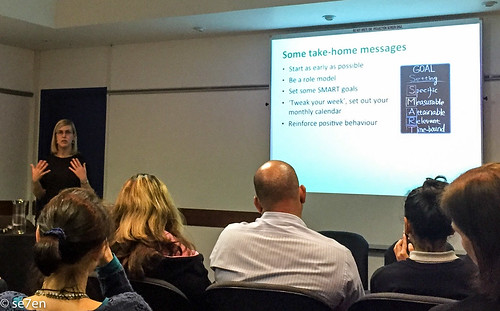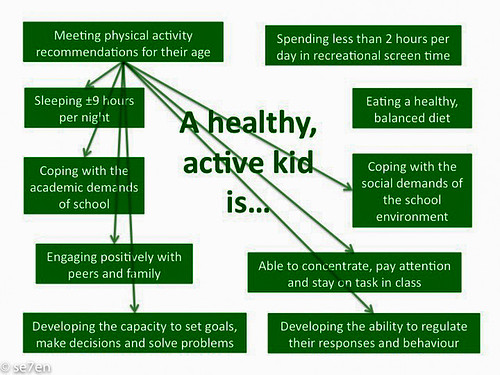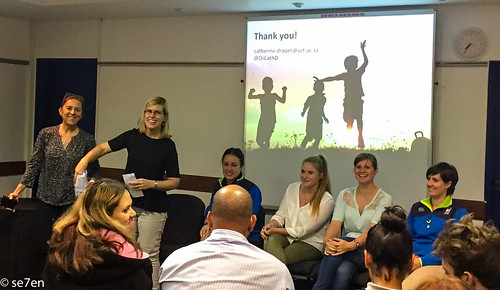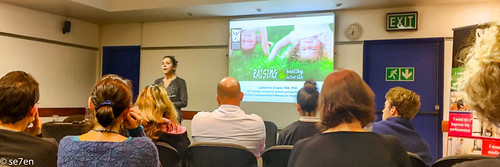I recently attended a talk at the Sport Science Institute of SA, a place that our kids totally loved visiting. The talk was part of their new initiative, The Kidz on the Move Programme, a programme to get the kids of Cape Town moving. They have begun a series of talks for interested parents, who want to get their kids moving and keep them moving…

Se7en+1 Concerns About Getting Our Kids Moving
- How Much Exercise Do Your Children Really Need? The benchmark for young children, under six is three hours a day of movement ranging from light through moderate and including vigorous movement and for kids older than six, at least an hour a day. Exercise doesn’t necessarily mean “school sport,” it can be any exercise, simply playing outside.
- Active Children Mean Active Teens: Without a doubt, I think we all want active teens. I do believe that kids that get used to moving and grow up within an active lifestyle, will continue that lifestyle, especially if that exercise serves a purpose. I know a long walk a couple of times a week does wonders for clearing my own head and making me feel better about the world, and I am convinced that it does the same good for our teens.
- Physical health is linked to Cognitive Health: The child that is physically fit does better in school, the more exercise they do the easier it is for them to self-regulate and so perform better in a learning environment. The counter example of this is that the overweight child exercises less and has less cognitive ability, feels down and so exercises less and so the cycle continues.
- Punishment and Sport Can Never Belong Together: This was so beyond my realm of comprehension that I am glad they explained it, frankly it goes against everything about exercise that you would want to install in a child. A child can be punished using sport as the tool, by depriving them of sport practice, which is essentially the exercise that they need to be the best they can be, or pushing them to endure too much and they lose their love of the sport. Just as I would never use reading as a punishment, it would never occur to me to tell a child that they couldn’t exercise… but clearly it needed to be said.
- Sedentary Behaviour Throughout the Day Loses the Benefits of the Exercise: And we all know that sedentary behaviour actually means screen time. They recommend a maximum of two hours of recreational screen time a day. Naturally if your child is spending large parts of it’s learning time on a screen, you may well have to adjust that number down. Basically if your child is doing their hour a day of exercise and spending the other 23 hours a day on a screen then your child will lose all the benefits of that hour of exercise.
- Screen Time is a Habit Learned Young: Excessive screen time is associated with unhealthy eating, inactivity, low self esteem, bullying, lack of sleep, less cognitive activity, psychological distress and difficulty connecting with peers, increased aggression and … well after hearing that… why would anyone let their children near a screen ever!!!
- Kids Are Not Getting Enough Sleep: And the biggest thief of sleep is of course, screen time. The blue light associated with our screen time deprives us of good quality sleep. Numerous studies have shown that late night screen time wether it is interactive or passive screen time, leads to disrupted sleep.
- Kids Need Better Role Models: Active parents tend to have active kids, simply because it is a lifestyle of exercise. When excercise is fun, kids enjoy it and they naturally keep at it. It is up to parents to be responsible examples with their screen time habits and the earlier they begin their children with good habits the better.


The Talk Was Followed by a Panel Discussion
The panel discussion was really an open forum for parents to ask professionals from the Sport Science Institute general questions about their children and exercise.
- They spoke about how nutrition plays a key role in a child’s overall health and study after study has shown that family rules work. If a family commits to healthier eating habits over all then the children will follow the example off their role models. Resist the lure of screen time and get active instead.
- One of the first questions tackled was what about too much exercise: Competitive sport is so intense that children at younger and younger ages are experiencing burnout, watch your kids for signs of burnout, watch for fatigue, withdrawal… and injury. Do everything you can to keep it fun, and especially for the child that hates exercise, get creative and find their happy exercising space.
- Early specialisation does not mean that a child will succeed in a particular sport, they need wider activity for a broader range of skill and activities. If your child wants to do a heap of activities and if they love it, then go for it.
- Another trend, concerning parents is that high schoolers are encouraged to drop sport in order to study more, particularly children in their last year of school. But numerous studies show that reducing exercise, reduces cognitive ability and so reduces rather than improves grades.

The Key message was: Start exercising early and as much as possible, be good role models for your kids, reinforce good behaviour and get kids outside… we are all far too quick to trade convenience for health. The best way to make sure that your kids are moving is to get them outdoors… and that is a whole ‘nother blog post.
I have to say this kind of talk would be very useful for parents whose kids are in a school environment and involved in competitive sport, they had a very balanced well rounded approach to kids and sport, with the kids’ interests being the priority. The talk was very much geared towards children who are in a school environment, where activities are created throughout a child’s day to keep them busy, and to provide a balance of things to do. As a homeschooling mom, I find I don’t provide activities so much as opportunities, it is a slightly different angle… but I think it is relevant. My kids have participated in organised sport, they aren’t olympic athletes and found that when they got to certain age the fun definitely stopped and competitiveness became more important than participation. For a while our kids attended the local gym and loved it, but when the coaches started painting their nails while the kids watched movies we knew it was time to get out and look for exercise in our everyday life. I personally hope that by providing my kids heaps of opportunities to have an active lifestyle, that when they are adults they will continue to walk to the store, walk to the library, go for a hike on weekends and so on. Hopefully a lifestyle of exercise will be so ingrained in them that when they don’t have a daily walk they will feel as if something is missing from their day and they can recognise what it is and adjust their routines to include it.
This is not a sponsored post, I was invited to the talk so that I could introduce our readers to The Kidz on the Move programme. SSISA hopes to offer more talks for parents in the future, so if you would like to be kept up to date, please email info@ssisa.com They offer a regular Kidz on the Move programme during the week, and will be offering a holiday programme from 3-6 October. More details at: https://www.ssisa.com/project/kidz-on-the-move/

2 Replies to “Introducing the Kidz on the Move Programme at the Sport Science Institute…”